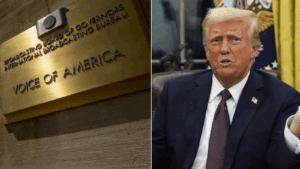In a landmark ruling, the US Supreme Court has ordered the Trump administration to facilitate the return of Kilmar Abrego Garcia, a Maryland man who was mistakenly deported to El Salvador due to an administrative error.
US Supreme Court Orders Return of Wrongly Deported Man to the US

US Supreme Court Orders Return of Wrongly Deported Man to the US
The high court's unanimous decision mandates the Trump administration to act on the wrongful deportation of a Maryland resident.
On Thursday, the Supreme Court delivered a unanimous 9-0 verdict rejecting an appeal from the Trump administration aimed at blocking a lower court’s directive to expedite Mr. Garcia's return. The justices emphasized the need for the government to ensure that Garcia's case is treated appropriately, just as it would have been had he not been wrongly deported.
Garcia, a Salvadorian national, was sent to the notorious Cecot prison in El Salvador, where gang members are typically detained, following his deportation stemming from an administrative mistake. Despite acknowledging the error, the Trump administration challenged a ruling from a Maryland district court that ordered his return by claiming that the district court overstepped its role.
US Solicitor General D. John Sauer highlighted the executive branch’s authority in foreign affairs, arguing against the judge's ability to mandate such an action. The Supreme Court's ruling not only reinstated the lower court's decision but also asked Judge Paula Xinis to clarify her original order concerning the facilitation of Garcia's return.
The government contends that Garcia has ties to the MS-13 gang, which his attorney disputes. The case now heads back to the trial court for further proceedings without a specified timeline for Garcia’s return.
Garcia, who entered the US illegally as a teenager, was granted protection from deportation in 2019 due to fears of persecution from gangs in El Salvador. His deportation on March 15 was contrary to a court ruling that prohibited it. His wife, Jennifer Vasquez Sura, has been vocally advocating for his return, describing the ordeal as a “roller coaster” of emotions for their family.
The Supreme Court's decision underscores the balance of power between judicial and executive branches regarding immigration cases and foreign policy, further illustrating the complex nature of deportation laws.
Garcia, a Salvadorian national, was sent to the notorious Cecot prison in El Salvador, where gang members are typically detained, following his deportation stemming from an administrative mistake. Despite acknowledging the error, the Trump administration challenged a ruling from a Maryland district court that ordered his return by claiming that the district court overstepped its role.
US Solicitor General D. John Sauer highlighted the executive branch’s authority in foreign affairs, arguing against the judge's ability to mandate such an action. The Supreme Court's ruling not only reinstated the lower court's decision but also asked Judge Paula Xinis to clarify her original order concerning the facilitation of Garcia's return.
The government contends that Garcia has ties to the MS-13 gang, which his attorney disputes. The case now heads back to the trial court for further proceedings without a specified timeline for Garcia’s return.
Garcia, who entered the US illegally as a teenager, was granted protection from deportation in 2019 due to fears of persecution from gangs in El Salvador. His deportation on March 15 was contrary to a court ruling that prohibited it. His wife, Jennifer Vasquez Sura, has been vocally advocating for his return, describing the ordeal as a “roller coaster” of emotions for their family.
The Supreme Court's decision underscores the balance of power between judicial and executive branches regarding immigration cases and foreign policy, further illustrating the complex nature of deportation laws.























